respiratory support
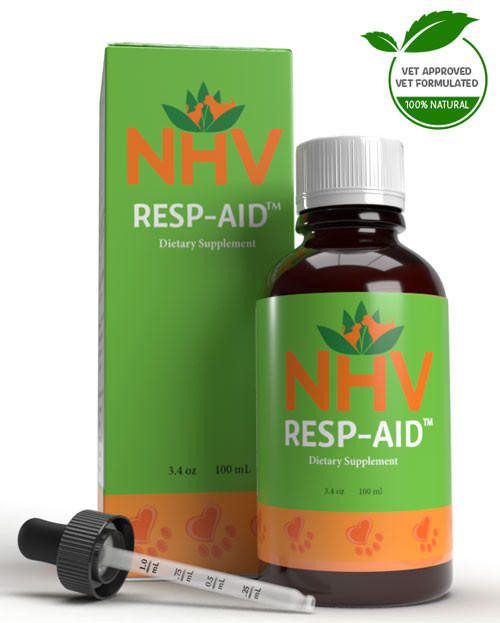
free shipping over $100 (USA & Canada)
1-877-937-4372 the pet expert hotline
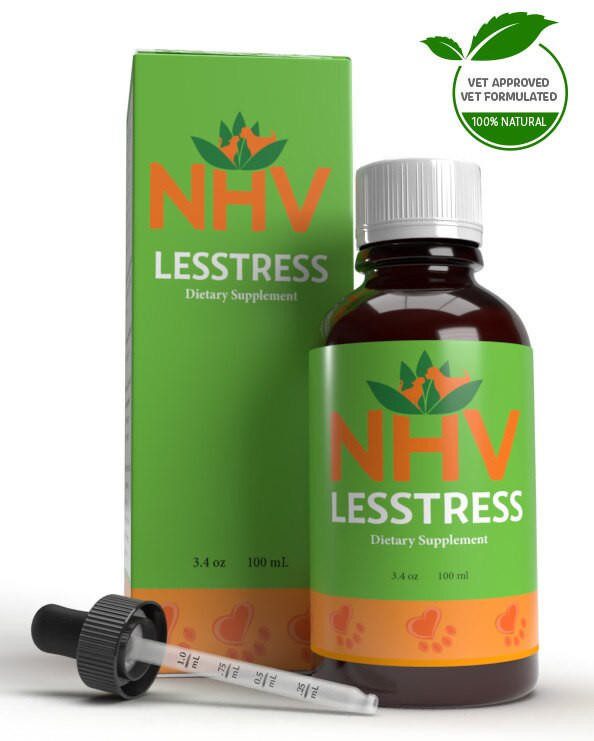
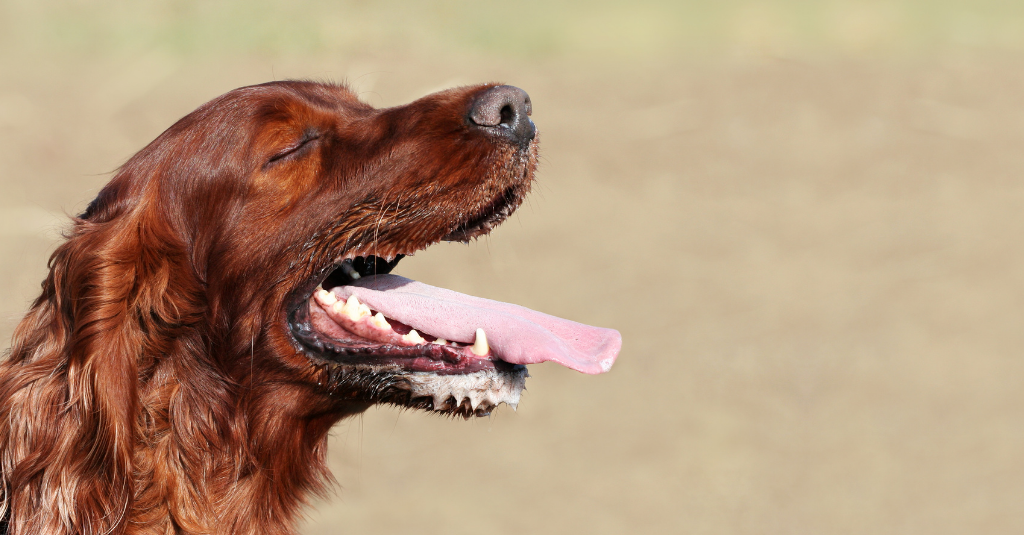
Panting is the mechanism dogs use that allows them to cool down when exposed to heat and exercise. When panting, they breathe out the hot air and breathe in cool air, while allowing water to evaporate from their tongue and mouth. This helps to bring their body temperature down since they don’t sweat like humans do. Brachycephalic breeds like bulldogs and pugs are more prone to panting due to their short snouts, as well as pets who are overweight.
Healthy dogs usually don’t need to pant in the absence of exercise or excitement. So, if your pooch starts panting suddenly, if they pant during rest or sleep, or if the panting is constant and intense, it could be a sign of an underlying health condition. In these cases, it is highly recommended to seek veterinary advice.
Here are some conditions that can be related to excessive panting and require treatment prescribed by a veterinarian:
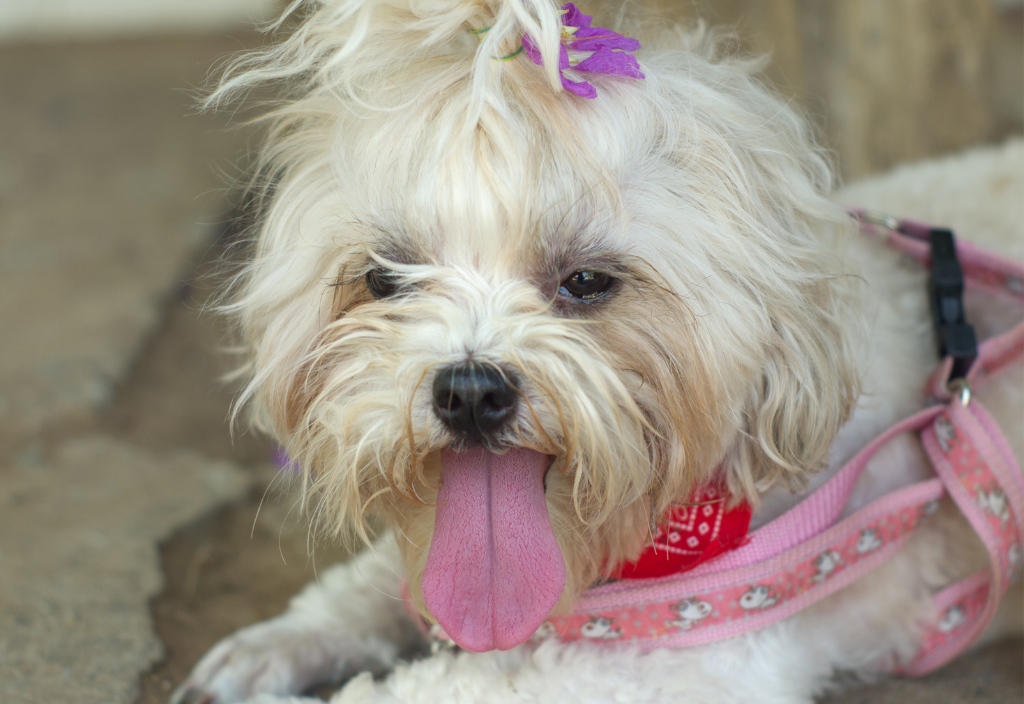
There are some natural supplements that can also be beneficial for panting, such as:
Lesstress: If your dog pants due to anxiety, Lesstress can be very helpful. This is an herbal formulation that acts on the nervous and immune systems, calming anxiety. Lesstress can help to reduce hyperactivity, relieve anxiety caused by separation, improve disposition, decrease destructive behavior, and balance the immune system.
Resp-Aid: This is our main support for the lungs and respiratory tract. The herbs found in Resp-Aid have anti-inflammatory and immune-enhancing properties that can help with upper respiratory congestion, fight off infections, and relieve shortness of breath.
Hearty-Heart: If your pooch is dealing with heart conditions, you could add Hearty-Heart to your little one’s regimen. This supplement acts as a cardiovascular tonic that promotes heart health and helps relieve symptoms such as coughing and difficulty breathing.
If you have any questions, do get in touch. Our pet experts are always here for you!
respiratory support

Vet-Formulated Remedy for Respiratory Infection in Dogs
buy 2 and save $3
3 month supply for a small to medium size
A 100% natural plant-based herbal remedy to help you dog fight infection and help relieve shortness of breath.
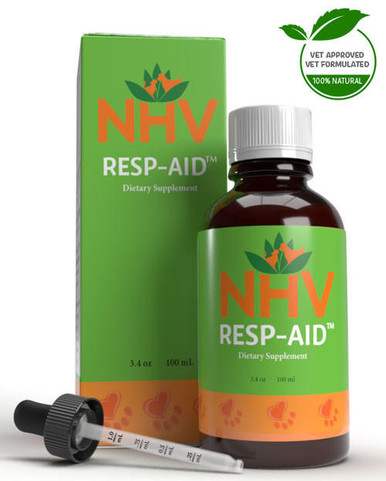
A 100% natural plant-based herbal remedy to help you dog fight infection and help relieve shortness of breath.
Dogs are susceptible to upper respiratory infections just like humans, and once infected, they can be highly contagious. Some breeds of dogs are more prone to getting respiratory infections, such as the Boston Terrier and Shih-Tzu. Find out if your dog breed is more prone to breathing difficulties and respiratory infections, and effective remedies for respiratory infection in dogs at NHV.
Symptoms of Respiratory Infections in Dogs
The symptoms are very similar to infection in humans.
Causes of Respiratory Infection in Dogs
Kennel cough is a common ailment among dogs that can be caused by a bacteria or viral infection.
NHV’s plant-based remedies can provide support along with vet-recommended treatment for respiratory infections in dogs. Read Bailee's tale of how NHV’s Resp-aid came to her rescue for allergic bronchitis.
You can read more about NHV Natural Pet Products and if you have questions about holistic supplements including our natural remedies for respiratory infections in dogs, ask an NHV expert, because, at NHV we want you and your canine companion to breathe easy naturally.
Your dog will breathe easier with NHV’s Resp-Aid, an all-natural plant-based formula containing these nine powerful herbs.
Beneficial Ingredients in NHV’s Natural Remedies for Respiratory Infections in Dogs
Select your pet's weight to determine the correct dose.
To be taken twice daily. Determine your pet’s weight and then use the easy chart below to determine the correct dose. This is the minimum dosage.
Pet's Weight Dosage
0 - 15 lb = 0.5 ml
16 - 30 lb = 1.0 ml
31 - 45 lb = 1.5 ml
46 - 60 lb = 2.0 ml
61 - 75 lb = 2.5 ml
Over 75 lb = 3.0 ml
How to Administer
Shake well before use. The easiest method is to use the dropper provide and places the drops into your pet’s food or favorite treat. You can also use the dropper and squirt directly into the pet’s mouth.
Some pets can be finicky, if this occurs consider hiding the drops in foods most pet’s love such as fish, chicken or yogurt or a favorite treat. If your pet only eats dry food then soak a few kibbles at feeding time.
For Best Results
Herbal dietary supplements are beneficial to the health and wellbeing of your pet and are safe for long-term use. Every pet responds to natural herbal supplements differently, therefore it is important to be consistent and administer the product daily. Supplements generally take two to four weeks to take effect, however this will vary from one animal to the next.
Product Storage
All NHV Natural Pet Products are pure herbal extracts and contain no artificial additives, preservatives or coloring. Shelf life after opening is 6 months and must be refrigerated after opening.
Cautions and Contraindications
Do not use in pregnant or nursing animals. Speak to your vet before using our products. A second visit is recommended if your pet’s condition does not improve, or deteriorates after continued use of the supplements.
All information provided by NHV Natural Pet Products is for educational purposes only.
Dogs are susceptible to upper respiratory infections just like humans, and once infected, they can be highly contagious. Some breeds of dogs are more prone to getting respiratory infections, such as the Boston Terrier and Shih-Tzu. Find out if your dog breed is more prone to breathing difficulties and respiratory infections, and effective remedies for respiratory infection in dogs at NHV.
Symptoms of Respiratory Infections in Dogs
The symptoms are very similar to infection in humans.
Causes of Respiratory Infection in Dogs
Kennel cough is a common ailment among dogs that can be caused by a bacteria or viral infection.
NHV’s plant-based remedies can provide support along with vet-recommended treatment for respiratory infections in dogs. Read Bailee's tale of how NHV’s Resp-aid came to her rescue for allergic bronchitis.
You can read more about NHV Natural Pet Products and if you have questions about holistic supplements including our natural remedies for respiratory infections in dogs, ask an NHV expert, because, at NHV we want you and your canine companion to breathe easy naturally.
Your dog will breathe easier with NHV’s Resp-Aid, an all-natural plant-based formula containing these nine powerful herbs.
Beneficial Ingredients in NHV’s Natural Remedies for Respiratory Infections in Dogs
Select your pet's weight to determine the correct dose.
To be taken twice daily. Determine your pet’s weight and then use the easy chart below to determine the correct dose. This is the minimum dosage.
Pet's Weight Dosage
0 - 15 lb = 0.5 ml
16 - 30 lb = 1.0 ml
31 - 45 lb = 1.5 ml
46 - 60 lb = 2.0 ml
61 - 75 lb = 2.5 ml
Over 75 lb = 3.0 ml
How to Administer
Shake well before use. The easiest method is to use the dropper provide and places the drops into your pet’s food or favorite treat. You can also use the dropper and squirt directly into the pet’s mouth.
Some pets can be finicky, if this occurs consider hiding the drops in foods most pet’s love such as fish, chicken or yogurt or a favorite treat. If your pet only eats dry food then soak a few kibbles at feeding time.
For Best Results
Herbal dietary supplements are beneficial to the health and wellbeing of your pet and are safe for long-term use. Every pet responds to natural herbal supplements differently, therefore it is important to be consistent and administer the product daily. Supplements generally take two to four weeks to take effect, however this will vary from one animal to the next.
Product Storage
All NHV Natural Pet Products are pure herbal extracts and contain no artificial additives, preservatives or coloring. Shelf life after opening is 6 months and must be refrigerated after opening.
Cautions and Contraindications
Do not use in pregnant or nursing animals. Speak to your vet before using our products. A second visit is recommended if your pet’s condition does not improve, or deteriorates after continued use of the supplements.
All information provided by NHV Natural Pet Products is for educational purposes only.
heart support
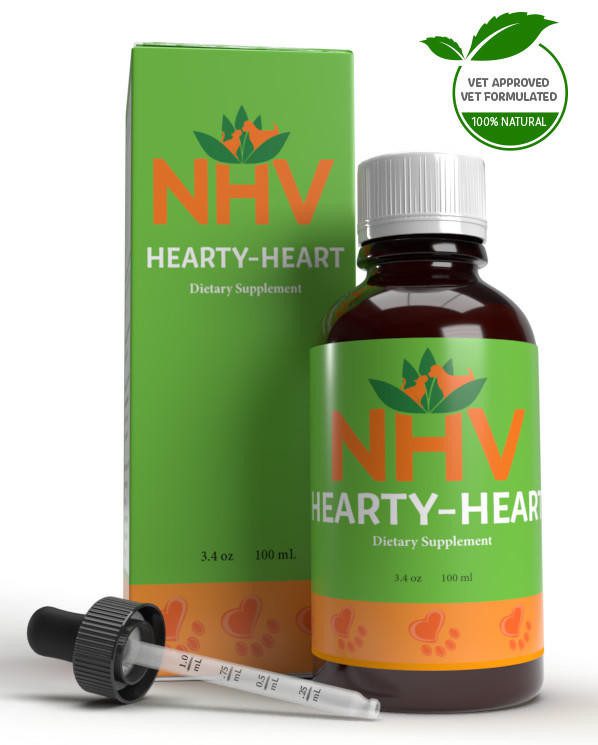
Supplement for heart conditions in dogs
buy 2 and save $3
3 month supply for a small to medium size pet.

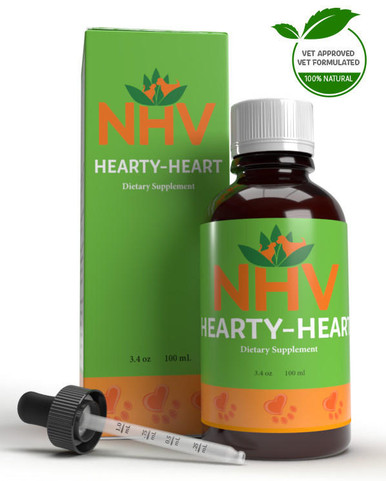

NHV Hearty Heart is an effective, gentle, and natural herbal remedy that supports and maintains healthy heart function in dogs. This heart supplement for dogs provides effective support for canine heart diseases and cardiovascular disorders.
Cardiovascular disease affects over 10% of all animals, and congestive heart failure affects 20-40% of dogs. The cardiovascular system is comprised of the heart, along with arteries and veins.
Once your dog is diagnosed with any heart issue, it will be a condition that persists for a lifetime. That is why taking care of your dog’s heart with supplements that are vet-formulated and all-natural are so important.
For vet advice regarding heart conditions in dogs, read Dr. Hillary Cook's blog to break down symptoms to look for, and breeds of dogs that are more at risk.
With NHV’s Hearty Heart, your dog will be getting a powerful blend of herbal remedies that provide support for the heart, valves, and the entire pulmonary system. The combination of potent botanicals delivers herbs to the heart that help to improve:
NHV’s Hearty Heart supplements for dogs contain a powerful blend of herbs that help the brain, lungs, major arteries as well as the heart itself.
Find out more about dog heart conditions with the inspiring story of Katie, the Cavalier who has genetic heart disease and found out that a little prevention goes a long way because, at NHV, we want your canine companion to live a long and healthy life naturally.
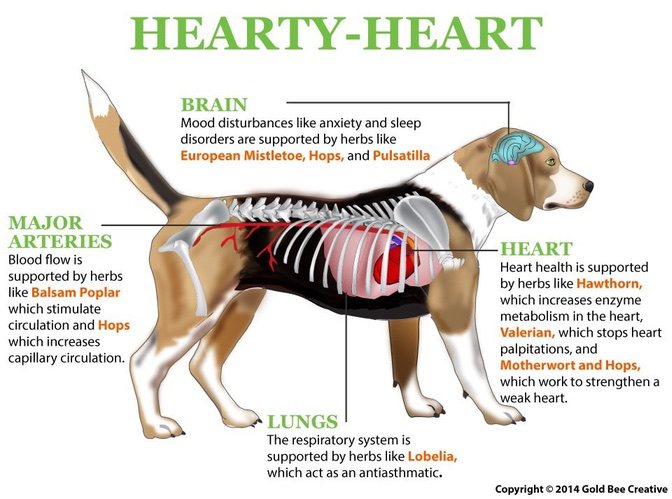
Hawthorne – the most powerful herb for the heart health of dogs. Hawthorn acts as a cardio tonic, which helps stabilize the heart’s activity based on what a dog’s heart needs; either to be stimulated or reduced. Hawthorn has traditionally been used for heart failure, heart palpitations, heart weakness, and for the circulatory system. This herb works by dilating the vessels and the coronary arteries, which improves the metabolic process and the blood supply to the heart and the rest of the body. Hawthorn may help with dog heart conditions by regulating your dog’s heart rate, coronary flow, and blood pressure. It also has a soothing and sedative effect that helps reduce stress.
Balsam Poplar – Encourages circulation and supports blood flow. Balsam Poplar has historically been used in North America by indigenous peoples for coughs, respiratory issues, and as a food for horses. This herb has strong anti-inflammatory and pain relieving properties.
Hops – Helps relax tension and anxiety while supporting circulation. This herb has calming, mild diuretic, and digestive properties. Studies have found that it helps as a heart supplement for dogs with restlessness and anxiety when experiencing physical stress.
Valerian – Beneficial for heart palpitations and regulates the nervous system. It is a gentle sedative that works on the nervous system by helping to calm a dog without making a pet drowsy. Valerian has been used by herbalist to help with anxiety and insomnia.
Woody Betony – This herb is one of the most valued in herbal medicine and has been used for decades for various ailments. It acts as a mild stimulant to the heart. Woody Betony is a nerve tonic that nourishes and builds vital energy. It contains glycosides, which may help reduce blood pressure in canines.
Lobelia – Causes immediate relaxation and expansion of the respiratory system that allows oxygenated blood to flow freely. It eases coughs brought on by heart issues.
European Mistletoe – This plant is considered to be a sacred plant and was called “all-heal" by the Celtic people. The parts used are the leaves and stems. Mistletoe has a long history in herbalism. It is used as a heart supplement for dogs to regulate blood pressure and to lower the heart rate. It also helps with anxiety, restlessness, and energy. Studies show that the herb Mistletoe has been used for various cancers as well.
Motherwort – Has a strengthening effect, especially on a weak heart. It is considered to be a mild sedative with relaxing properties. Motherwort has been used in herbal preparations to help ease heart palpations and rapid heart rates. It is a cardiotonic, which has traditionally been used to improve blood flow and to support heart health.
Pulsatilla – this herb is known to be antispasmodic which is considered to be beneficial in relaxing the heart muscle and helps to soothe coughing.
Select your pet's weight to determine the correct dose.
To be taken twice daily. Determine your pet’s weight and then use the easy chart below to determine the correct dose. This is the minimum dosage.
Pet's Weight Dosage
0 - 15 lb = 0.5 ml
16 - 30 lb = 1.0 ml
31 - 45 lb = 1.5 ml
46 - 60 lb = 2.0 ml
61 - 75 lb = 2.5 ml
Over 75 lb = 3.0 ml
For small animals (rabbits, ferrets), avians and reptiles use 1 drop for every 2 lb of body weight.
How to Administer
Shake well before use. The easiest method is to use the dropper provide and places the drops into your pet’s food or favorite treat. You can also use the dropper and squirt directly into the pet’s mouth.
Some pets can be finicky, if this occurs consider hiding the drops in foods most pet’s love such as fish, chicken or yogurt or a favorite treat. If your pet only eats dry food then soak a few kibbles at feeding time.
For Best Results
Herbal dietary supplements are beneficial to the health and wellbeing of your pet and are safe for long-term use. Every pet responds to natural herbal supplements differently, therefore it is important to be consistent and administer the product daily. Supplements generally take two to four weeks to take effect, however this will vary from one animal to the next.
Product Storage
All NHV Natural Pet Products are pure herbal extracts and contain no artificial additives, preservatives or coloring. Shelf life after opening is 6 months and must be refrigerated after opening.
Cautions and Contraindications
Do not use Hearty-Heart in pregnant or nursing animals. Speak to your vet before using our products. A second visit is recommended if your pet’s condition does not improve, or deteriorates after continued use of the supplements.
All information provided by NHV Natural Pet Products is for educational purposes only.
NHV Hearty Heart is an effective, gentle, and natural herbal remedy that supports and maintains healthy heart function in dogs. This heart supplement for dogs provides effective support for canine heart diseases and cardiovascular disorders.
Cardiovascular disease affects over 10% of all animals, and congestive heart failure affects 20-40% of dogs. The cardiovascular system is comprised of the heart, along with arteries and veins.
Once your dog is diagnosed with any heart issue, it will be a condition that persists for a lifetime. That is why taking care of your dog’s heart with supplements that are vet-formulated and all-natural are so important.
For vet advice regarding heart conditions in dogs, read Dr. Hillary Cook's blog to break down symptoms to look for, and breeds of dogs that are more at risk.
With NHV’s Hearty Heart, your dog will be getting a powerful blend of herbal remedies that provide support for the heart, valves, and the entire pulmonary system. The combination of potent botanicals delivers herbs to the heart that help to improve:
NHV’s Hearty Heart supplements for dogs contain a powerful blend of herbs that help the brain, lungs, major arteries as well as the heart itself.
Find out more about dog heart conditions with the inspiring story of Katie, the Cavalier who has genetic heart disease and found out that a little prevention goes a long way because, at NHV, we want your canine companion to live a long and healthy life naturally.

Hawthorne – the most powerful herb for the heart health of dogs. Hawthorn acts as a cardio tonic, which helps stabilize the heart’s activity based on what a dog’s heart needs; either to be stimulated or reduced. Hawthorn has traditionally been used for heart failure, heart palpitations, heart weakness, and for the circulatory system. This herb works by dilating the vessels and the coronary arteries, which improves the metabolic process and the blood supply to the heart and the rest of the body. Hawthorn may help with dog heart conditions by regulating your dog’s heart rate, coronary flow, and blood pressure. It also has a soothing and sedative effect that helps reduce stress.
Balsam Poplar – Encourages circulation and supports blood flow. Balsam Poplar has historically been used in North America by indigenous peoples for coughs, respiratory issues, and as a food for horses. This herb has strong anti-inflammatory and pain relieving properties.
Hops – Helps relax tension and anxiety while supporting circulation. This herb has calming, mild diuretic, and digestive properties. Studies have found that it helps as a heart supplement for dogs with restlessness and anxiety when experiencing physical stress.
Valerian – Beneficial for heart palpitations and regulates the nervous system. It is a gentle sedative that works on the nervous system by helping to calm a dog without making a pet drowsy. Valerian has been used by herbalist to help with anxiety and insomnia.
Woody Betony – This herb is one of the most valued in herbal medicine and has been used for decades for various ailments. It acts as a mild stimulant to the heart. Woody Betony is a nerve tonic that nourishes and builds vital energy. It contains glycosides, which may help reduce blood pressure in canines.
Lobelia – Causes immediate relaxation and expansion of the respiratory system that allows oxygenated blood to flow freely. It eases coughs brought on by heart issues.
European Mistletoe – This plant is considered to be a sacred plant and was called “all-heal" by the Celtic people. The parts used are the leaves and stems. Mistletoe has a long history in herbalism. It is used as a heart supplement for dogs to regulate blood pressure and to lower the heart rate. It also helps with anxiety, restlessness, and energy. Studies show that the herb Mistletoe has been used for various cancers as well.
Motherwort – Has a strengthening effect, especially on a weak heart. It is considered to be a mild sedative with relaxing properties. Motherwort has been used in herbal preparations to help ease heart palpations and rapid heart rates. It is a cardiotonic, which has traditionally been used to improve blood flow and to support heart health.
Pulsatilla – this herb is known to be antispasmodic which is considered to be beneficial in relaxing the heart muscle and helps to soothe coughing.
Select your pet's weight to determine the correct dose.
To be taken twice daily. Determine your pet’s weight and then use the easy chart below to determine the correct dose. This is the minimum dosage.
Pet's Weight Dosage
0 - 15 lb = 0.5 ml
16 - 30 lb = 1.0 ml
31 - 45 lb = 1.5 ml
46 - 60 lb = 2.0 ml
61 - 75 lb = 2.5 ml
Over 75 lb = 3.0 ml
For small animals (rabbits, ferrets), avians and reptiles use 1 drop for every 2 lb of body weight.
How to Administer
Shake well before use. The easiest method is to use the dropper provide and places the drops into your pet’s food or favorite treat. You can also use the dropper and squirt directly into the pet’s mouth.
Some pets can be finicky, if this occurs consider hiding the drops in foods most pet’s love such as fish, chicken or yogurt or a favorite treat. If your pet only eats dry food then soak a few kibbles at feeding time.
For Best Results
Herbal dietary supplements are beneficial to the health and wellbeing of your pet and are safe for long-term use. Every pet responds to natural herbal supplements differently, therefore it is important to be consistent and administer the product daily. Supplements generally take two to four weeks to take effect, however this will vary from one animal to the next.
Product Storage
All NHV Natural Pet Products are pure herbal extracts and contain no artificial additives, preservatives or coloring. Shelf life after opening is 6 months and must be refrigerated after opening.
Cautions and Contraindications
Do not use Hearty-Heart in pregnant or nursing animals. Speak to your vet before using our products. A second visit is recommended if your pet’s condition does not improve, or deteriorates after continued use of the supplements.
All information provided by NHV Natural Pet Products is for educational purposes only.
Published: November 24, 2021